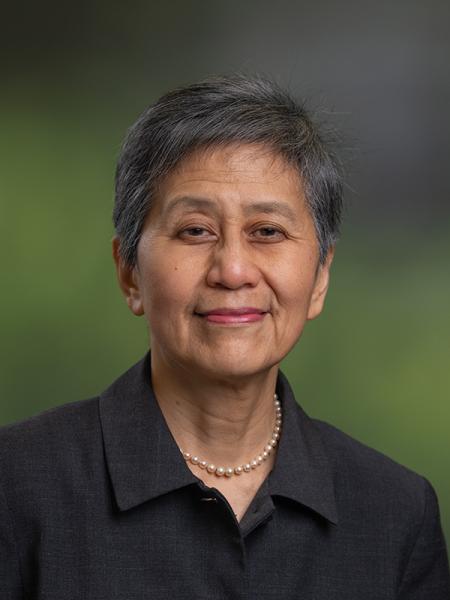
Nancy Cheng
MArch Harvard University, 1990
BA cum laude (Architecture and Mechanical Engineering) Yale University, 1983
Registered Architect: Massachusetts (inactive), NCARB, LEED AP, NOMA
Research and Creative Work Website: Nancy Yen-Wen Cheng
Associate Professor Emerica Nancy Yen-wen Cheng promotes the design of sustainable, just and healthy communities in teaching architecture and digital methods at the University of Oregon. She led the Architecture Department January 2018-March 2021, facilitating transition to a new School structure and to remote teaching for the pandemic, She directed the UO Architecture Portland Program 2009-2013. Interest in how individuals think and interact has driven her design research and teaching. She studies how tools and approaches shape the design process, focusing on digital technology as a nexus for innovation and cultural change. In the design studio, she seeks to maximize creative engagement through tactile processes such as sketching and material manipulation, then refining ideas through computation.
In 2026, she taught about lightweight timber structures and consulted about the basic design curriculum at the Universidad Cientifica del Sur in Lima, Peru through the Fulbright Specialist Program. In 2020, she received funding from the Global Justice Project to bring international visitors to Oregon to teach and work on Adaptable Refugee Housing. With global partners, she is researching at how DIY building systems can empower future users to customize their own environmnts. This project builds on her physical+digital studies of sculpting sheet materials into shading devices and lightweight structures. Her Shaping Light project explores how shading devices with undulating surfaces can block heat and glare while using the sun's movement to create dynamic visual interest. She exhibited sculptural work in Portland, OR's PLACE studio in summer 2017 and gave several workshops on lightweight structures. As a Visiting Associate Professor at the RMIT University in Melbourne (Spring 2014), she collaborated with the Spatial Information Architecture Lab to examine the cooling potential of folding surfaces using parametric design, solar simulation and digital fabrication. While on sabbatical 2013-14, she gave lectures and workshops in China, India, Australia and Germany, supervising students to create light and shadow installations for the Wuhan 403 International Arts Center.
To gain insight into the conceptual design process, in 2003-2005, Cheng used a digital pen that stores animations to reveal processes of abstraction, speculation and decision-making. She has presented her Digital Sketching project in the International Journal of Architectural Computing and at conferences abroad. She has also conducted workshops on digital sketching for universities and for professional organizations on design communication. This project, which grew out of an earlier investigation of ways to gather, analyze, and represent ideas about place, was awarded competitive grants from the Northwest Academic Computing Consortium, Logitech Corporation, and Intel's Research and Development Arts and Entertainment Division.
Cheng’s teaching reflects a broad-based Yale undergraduate education where she studied architecture, art and engineering. As a design teacher and leader, Cheng seeks to create more effective processes and more sustainable places for interaction. She is intrigued by how people interact with tools and environments and how these interactions can shape an individual’s perceptions and effectiveness. From this interest, her students have worked with five Oregon intentional communities to envision sustainable housing and common facilities. Her pioneering work with online communities started in the 90's, when her Virtual Design Studios connected architecture students from Asia, Europe and North America.
She has used online technology to bring in global experts, to strengthen local learning communities and connect to remote clients. From 2008-2011, UO Academic Affairs supported her work with Business, Arts Administration and Education colleagues and the Inter/National Coalition for Electronic Portfolio Research on using Web 2.0 tools to support the development of student reflection, collaboration and communication skills. A complement to online partnerships, Cheng has organized and directed global study programs in Shanghai, Rome, and Hong Kong.
Before joining the faculty at the University of Oregon, Cheng held posts as a visiting scholar at the Massachusetts Institute of Technology and a lecturer at the University of Hong Kong, where she received research support for projects exploring spatial visualization. She also worked for a decade for architecture firms in Massachusetts, including Kallmann McKinnell & Wood Architects, Tams Consultants, Inc., CBT, Inc., Graham/Meus Inc., and Raphael Moneo & Associates. Cheng activities as a designer include a series of lighting installations and collaboration on a design competition entry that was awarded a Gold Medal for Environmental Sensitivity in 2000.
Cheng keeps active with professional organizations to better understand how the department can better serve the profession. She is currently serving on the board of the Architectural Foundation of Oregon and has recently served on the national AIA Higher Education Advisory Team and the Harvard Graduate School of Design Alumni Council. She served as President of the Association of Computer Aided Design in Architecture (ACADIA) from 2009-2011, won the 2014 ACADIA Society Award of Excellence and chaired the national AIA's Technology In Architectural Practice knowledge community. She has guest-edited three issues of the International Journal of Architectural Computing and co-chaired the AIA-TAP/ACADIA 2004 Conference on Fabrication. She has served on the ACADIA Steering Committee and research review committees for ACADIA (North American), CAADRIA (Asian), ECAADE (European), SiGRADi, ASCAAD (Arab) computer-aided architectural design groups, and the Association of Collegiate Schools of Architecture. She has also served on the jury of the Far Eastern International Digital Architectural Design award for several years and has acted as a grant reviewer for the Hong Kong Research Grants Council and the American Association for the Advancement of Science. As a double major in Architecture and Mechanical Engineering, she graduated with honors from Yale University, and then received her M.Arch. from Harvard Graduate School of Design where she was a teaching assistant for William J. Mitchell.
